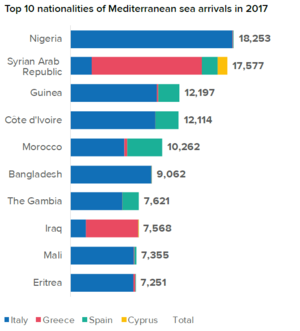Our new NorthStandard site is now live. There will be no new content or updates added to this site. For the latest information, please visit our new site north-standard.com.
Refugees/migrants at sea
News & Insights 29 June 2018
The current unrest in large areas of Africa, Asia and the Middle East has led to a recent and marked increase in the number of people attempting to cross the Mediterranean Sea in search of better opportunities. According to the UN...
The current unrest in large areas of Africa, Asia and the Middle East has led to a recent and marked increase in the number of people attempting to cross the Mediterranean Sea in search of better opportunities. According to the UN High Commission for Refugees, it is estimated that 178,500 refugees/migrants crossed the Mediterranean in 2017 and up to 4,901 migrants and refugees have died or remain missing this year alone.
1,015,000
refugees/migrants are estimated
to have crossed the Mediterranean in 2015
369,300
refugees/migrants are estimated
to have crossed the Mediterranean in 2016
178,500
refugees/migrants have crossed the
Mediterranean in 2017
Obligations under international conventions
It is a long-established tradition that ships should provide assistance to those in peril.
Pursuant to Article 98 of UNCLOS, the master of a commercial ship has a duty to ‘render assistance to any person found at sea in danger of being lost… in so far as he can do so without serious danger to the ship, the crew or the passengers’. This duty is repeated under SOLAS Chapter V Regulation 33, which provides that absent ‘special circumstances’, a ship is ‘bound to proceed with all speed’ to assist persons in distress.
Failure to do so can result in a fine or up to two years’ imprisonment.
A master is therefore under a general duty to answer any distress call, whether received from a ship directly or via an order from a regional or local authority.
Practical steps to be taken in a Search and Rescue (SAR) operation
The following steps are a guide only and the master should always respond in a safe and sensible manner, considering the specific circumstances.
- Urgently contact the nearest or responsible maritime authority/coast guard and, if needed, nearby ships that may also be able to assist.
- Establish a clear plan for the safe rescue of the distressed persons prior to its commencement.
- Provide assistance and rescue the distressed persons.
- Note the number of distressed persons rescued. Specify name, gender, age and nationality.
- Identify whether any of the rescued persons have any special medical needs.
- Maintain open dialogue with the responsible maritime authority/coast guard at all times. Maintain good internal communication among the crew.
- Inform all the interested parties, including managers, charterers, as well as the club, of the situation as soon as possible. In particular, appointment of the club’s local correspondent at the designated port of disembarkation can assist in minimising disruption and delay to the ship.
- Keep a very careful and detailed record of the entire event (the use of photographs, videos and written reports can assist).

Source: UN High Commissioner for Refugees (UNHCR)
Wider guidelines for owners/operators
Given the data regarding origin and destination countries, if members are trading in the Mediterranean, there is a real possibility that they will encounter distressed persons at sea and/or be asked to assist in a SAR operation.
Members are therefore advised to:
- ensure the crew is fully briefed well in advance of entering the Mediterranean of the ship’s emergency plans and procedures set in place to cope with an SAR situation of this nature;
- keep stores of bottled water, ready food, medicines and nutrition on board the ship in order to meet the demands of an emergency response;
- consider addressing this situation in advance when agreeing to charterparties that would include ships trading in the Mediterranean. That includes addressing the possible costs, expenses and time that may be incurred should a ship deviate to engage in an SAR operation;
- ensure saved persons are not allowed to take any of their personal belongings on board, apart from clothes/blankets, to prevent potentially threatening situations arising. All the saved persons must be searched and any weapons or dangerous objects confiscated;
- provide crew with gloves and other PPE to avoid the potential spread of any diseases aboard the ship.
Club cover
The cost and expense of the diversion of the ship in order to rescue, and thereafter land, the distressed persons is likely to be a significant concern for a member instructed to complete a search and rescue (SAR) mission.
Rule 3.4 of the club’s P&I rule book states that the following is covered: ‘Port and other charges solely incurred for the purpose of landing stowaways or refugees, or others saved at sea, or landing or securing the necessary treatment for an injured or sick person, other than crew, including the net loss to the member in respect of fuel, insurance, wages, stores and provisions incurred for such purpose.’
This rule makes it clear that the club will cover the cost of a diversion, if the diversion is incurred solely as a consequence of the ship having persons saved at sea on board. Whether the cost is ‘solely incurred’ will be assessed on the facts of each case.
The diversion costs, which can be reimbursed, include extra costs of fuel, insurance, wages, stores, provisions and port charges. A member will be asked to supply a breakdown of the expenses incurred, with supporting documentation, in order for the club to establish the sums properly due to be reimbursed. For example, a bunker calculation should be supplied together with a bunker invoice.
Additionally, the club will cover the cost of maintaining saved persons on board the ship. This will include the cost of providing maintenance, food and medicines.
Lastly, the diversion could lead to substantial time being lost for an owner member. It is important to note that compensation will not be payable for hire lost during a SAR operation, as this is an excluded loss under the club’s rules. Therefore, it is important that members give careful thought to making express and clear provision within their commercial contracts as to who – principally owner or charterer – will be liable for hire payable during a SAR operation.
Before seeking reimbursement from the club, the member should first consider seeking reimbursement from the competent authority instructing the member to take part in the SAR or alternatively from the ship’s flag state.
Members would be well advised to notify the club as soon as they encounter any distressed persons at sea or as soon as they are called upon by a competent maritime authority to take part in SAR operations. In such circumstances, the club will instruct the local correspondent to assist the local agents in taking all the necessary precautions to ensure the smooth disembarkation of the saved persons. Such precautions taken before the ship’s arrival will ensure that the member meets all of its obligations and will also, hopefully, expedite the procedures and minimise any delay to the ship.
The Standard Club will closely monitor this issue and keep members fully updated on any developments, with further alerts and/ or publications where necessary.
The information and commentary herein are not intended to amount to legal or technical advice to any person in general or about a specific case. Every effort is made to make them accurate and up to date. However, no responsibility is assumed for their accuracy nor for the views or opinions expressed, nor for any consequence of or reliance on them. You are advised to seek specific legal or technical advice from your usual advisers about any specific matter.
Category: Cover Including Discretionary Claims

